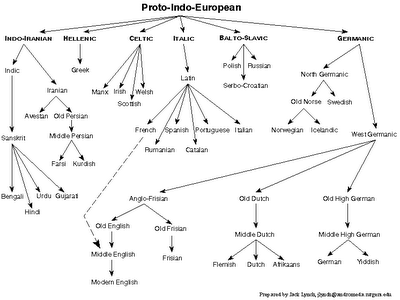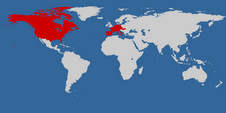Why do we all say "CARDIologist"?
Regardless of the language we speak, we all have a word for ♥ and another for the medical specialist that takes good care of it, whenever love is no longer the only solution to a problem.
It all goes back some thousands of years – about eight – when the Indo‑Europeans moved from the Hindustani peninsula across south-western Asia to Europe. Grammarians and linguists have been busy with that people's language since the 18.th century, and their studies allowed them to postulate a common origin for western languages (with few exceptions) as we know them today.
The common origin for ♥ is the Indo‑European root *KERD- that went on evolving in different ways according to the ethnic subgroups that were formed as time passed and people spread throughout the Old Continent and settled on diverse regions. Let's follow their trail.
– Latin COR, CORDIS:
Portuguese CORAÇÃO
Spanish CORAZÓN
Italian CUORE
French CŒUR
– Germanic *HERT-ON
English HEART
Dutch HAART
Swedish HJÄRTA
Danish, Norwegian HJERTE
German HERZ
– Classical Greek ΚΑΡΔΙΑ [kar'dia]
Modern Greek ΚΑΡΔΙΑ [kar'dja]
So now we have all these different words to say ♥, but when we mention the specialist doctor we all make use of a word built upon Classical Greek elements.
In different ways, there is unity in diversity.
(The forms preceded by * are reconstructed, which means they are not attested by any written document.)
quinta-feira, 12 de outubro de 2006
The origins' origin
Editado por RIC às 11:54
Separadores:
Linguística
![]()
Subscrever:
Enviar feedback (Atom)




















24 comentários:
heart = complicated
Good afternoon, Minge! Delighted to have you around!
Yes, in mathematical terms I guess you're right with that equation. In linguistic terms it's quite complex indeed. And in daily life it's what we all know...
All the best! :-)
The sounds of a language change over decades like stones being shaken up in a bag. One stone pushes a second into a space, and a third falls into the place where the second was, shifting a fourth etc. /f/ might become /p/, pushing /p/ into /b/, which pushes /b/ into /v/, which assimilates with /w/.
A physicist can use Newton's laws of motion to estimate how the stones were probably positioned one minute ago, but there's too many variables to be certain. A phonologist can use "laws" (which are really tendencies) of phonological change to reconstruct how a language might have sounded 100 years ago.
Stones don't have social forces like fashion, war, class, trade and media - but of course human societies and their languages have all these and more. The algebra used to reconstruct the sounds of PIE (what I understand of it) is elegant and plausible - far more elegant and plausible than real human history. So I fear PIE may be a fantasy. It's still worth trying though.
There is a project to trace all human languages back to a single set of sounds and words. The project and hypothetical language is called Nostratic.
Ric,
Equally interesting is the historic and geographic range of the association of the heart with love and emotions. At least in the West this association must be very old, since it is shared by several ancient peoples belonging to different linguistic and ethnic families; for example ancient Hebrews (Semites), Greeks (Indo Europeans), and Egyptians (Hamites) and perhaps others. The association of the heart with love and emotions predates any documented contact between the ancient Greeks and Hebrews.
Interestingly enough, East Asians seem to have a somwhat different association with the heart. Like in the West, in China the heart is also the control center of the body, but the emotions are the domain of the liver.
languares and accents are pure music to my ears
Muito «soft», mas não menos interessante...
Obrigada, Ric. Já aprendi a escrever coração em mais línguas.
Boa noite :-)
Hello Captain! I knew you would react to this piece of «light» historical linguistics.
A reconstruct is always a reconstruct. It may be plausible - and so be a true helpful means - or it may be just a fantasy. At the moment PIE seems more credible than Nostratic, but it may be just a matter of time until the theory and used devices become more powerful. You know how scientific knowledge evolves.
I taught Portuguese phonetics, phonology and morphology for five years some years ago. I do like linguistics very much.
Thank you very much! :-)
Hello Bruce! I was expecting someone might bring up the symbolism of the heart in different cultures. I'm quite glad you did.
As to emotions, curiously enough, we have a saying according to which someone who has a bad temper has «bad livers» (literally). It might be somehow related, don't you think?
I thank you so very much for your kindness and knowledge! :-)
Hello Will! I'm glad to hear that. Generally those who enjoy music and have a good ear also enjoy the sounds of different languages. I believe I woke up for that reality when I was about 5-6 years old, exactly through songs in foreign languages, which fascinated me enormously.
All the best!
Minha cara Carla, já aconteceu hoje tanta coisa menos «soft» (aliás, bem pesada) que eu já não sei muito bem o que quererás dizer com esse «soft» seguido de «mas»...
É uma mera curiosidade linguística. Não concebo este espaço como destinado a sérias e aprofundadas explanações científicas (ainda que ás vezes me apetecesse, mas isto não é uma cátedra e eu não quero chatear ninguém).
Tudo de bom! :-)
Ao que parece, não fui a única a ter um dia 'duro'. Adiante...
Em relação ao «soft», vou (tentar) explicar:
Não costumo ler os posts só por ler. Gosto de tirar 'sumo' deles. Embora haja alguns, que penso serem poucos sumarentes. É ler e assimiliar. Foi o caso deste.
Será que fiz-me entender um pouco melhor?
Tudo de bom também para ti :-)
Perfeitamente, minha cara!
A ideia é permitir alguma variedade nos assuntos e na «quantidade de sumo»...
Não posso - nem quero - estar sistematicamente a atirar com livros para cima das pessoas. Como o blog NÃÓ é o meu diário, não há lugar para confissões. Mas vou tentar introduzir uma dimensão mais pessoal, para já esporádica. Depois, logo se vê.
Um bem melhor dia para amanhã! :-)
I am on a project with a group of people evaluating software and the vendors associated with it. Almost everyone complains about one vendor whose key person is a highly Americanized person of Asian India background. They keep complaining that they “cannot understand him”. So, a three million dollar deal will turn on that?
I keep saying that I have no problem whatsoever with understanding him, and in fact enjoy the musicality of his accent. Then they all repeat their negative comments. I love accents, foreign and domestic. I listen to a subtle tine and try to identify it’s origin to understand something about the speaker.
So...I wonder how funny it is when, say, a Swede learns and speaks Portuguese. There are definite fingerprints when this person speaks English. There is a part of the US (this is part of my own linage) where the Swedes congregated and when I was a child there were many comical characters based on American Swedes speaking is their comical accent. Which foreigners sound the strangest speaking Portuguese?
That's an amusing exercise I've been doing for a long time now: guessing the mother language by the phonetic footprints it leaves in learned languages.
Phonetically, European Portuguese is complicated to most foreigners, and I can trace them quite easily. But English speaking people find it really very hard. The best are those speaking Slavic languages: in a few months they almost speak like us (because they use the same sounds).
have many things to say about language
So say them all, Will! I'll be waiting for your e-mail also answering to my long, most recent one. And now I'm off to bed. I've done more tonight than I ever thought I would. Tomorrow's another day (i Svenska: i morron är en annan dag...)
Enjoy your night!
A very interesting read, Ric! Thank you for a thought provoking post and something to ponder.
I'm glad it interests you, Gray! As a matter of fact, it is more like a linguistic curiosity, but I do love these things, that's also true...
Thanks for your «wires»! (lol)
Best wishes!
Ric,
English speaking people seem to find the phonetics of amost any other language extremely difficult. Their problem isn't just with Portuguese.
I'm not sure whether its simply a problem with the nature of English phonetics that causes this problem, or a form of cultural imperialism. It is one thing to master the vocabulary and grammar of a foreign language. That is essentially an intellectual process.
To master the phonetics, however, requires a willingness to imitate, and even to transform yourself into the identity of a speaker of the target language. This process requires a whole different set of motivations. Englishmen and Americans generally don't want to be anything else but Englishmen and Americans (after all, we have been the dominant power in the western world for the last 300 years or so).
This may smack a bit of cultural arrogance, and in fact, it may imply just that in many cases. But not always. My Italian partner speaks fluent, grammatically almost perfect English, with a vocabulary that rivals my own. But all with a strong Italian accent. He is hardly an Italian nationalist and, in fact, has lived much of his life outside of Italy. But he is still very happy being Italian and it would never occur to him to try to be anything else. No arrogance; just a knowledge and acceptance of who he is.
The ultimate proof of this is when he speaks Chinese, he has much less of an Italian accent, since the phonetic system of Chinese is such that a strong foreign accent would render the speaker's Chinese incomprehensible. He's willing and able to give up his Italian identity, but only when it's absolutely necessary.
Also, it seems to me that the best linguists in western Europe are the Dutch. Is this because their own langauge is phonetically so bizarre, or is it because of their traditionally tolerant cultural attitude and lack of nationalism?
BTW, it generally comes as a surprise to English speakers that European Portuguese sounds more like Polish than like Spanish or Italian.
Hello Bruce!
Starting just where left, I was once sitting in an outdoor café in Düsseldorf with another Portuguese, and we were talking to each other. I suddenly noticed an older lady looking at us quite intensely. After a while she just couldn't help asking me whether we were... Russians! All the sounds she had been listening to could in fact be Russian, she said, but she hadn't understood a single word...
Perceptive acoustics has also been dealing with the process of acquiring a foreign language and has come up with the so-called perceptive deafness theory: the less vocalic phonemes the mother language has, the more difficult it is for the speaker to reproduce accurately another system involving more vowels. This might explain what you said about the English and Americans in general. However, a former English professor of mine, who learned Portuguese in his adulthood, speaks exactly as we do! There's no way you can say that man is English. And the truth is English has a considerable set of vocalic phonemes.
Dutch may sound bizarre indeed, but phonetically it stands between German and English. The strangest about it for English ears is that it is still before the «great vwel shift English underwent about the 16.th century, when «nice» was still pronounced [neece]. And I must agree with you: Dutch do learn easily. However, according to Dutch law every citizen must speak English as first foreign language... Maybe that's why.
Thank you very much! :-)
I'd like to add that in a sense, the separate word "cardiologist" is sensible. After all, a "cardiologist" isn't a specialist of the heart, but one who is a student of cardiology (the science of the heart). I suppose in Esperanto, you could say "korosciencisto" (heart-science-professional), but most would argue that "kardiologiisto" would be more internationally recognizable (I won't even go there).
Etymologically, that is quite true, Zooplah, but as the word - not to mention the concept - never existed in Classical Greek since it was build as a neologism, I believe we can say that semantically «specialist of the heart» is correct. It's also its definition in dictionaries.
Thank you!
fascinating!
It is, isn't it, Gumby? I enjoy this kind of stuff very much as well.
Enviar um comentário